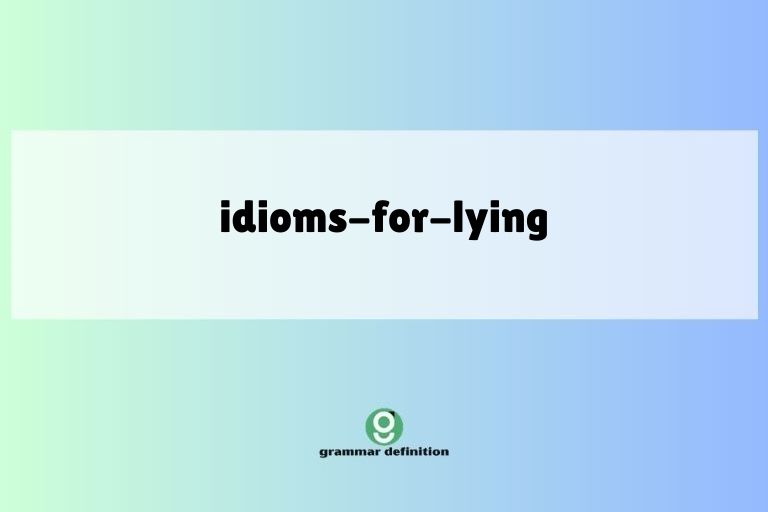Idioms for Impossible Situations: A Comprehensive Guide

English is rich with idioms, and understanding them is crucial for mastering the language. Idioms add color and depth to communication, making it more engaging and nuanced.
One particularly interesting category of idioms revolves around describing impossible situations. These idioms often use figurative language to convey the sense of hopelessness or the sheer improbability of a certain outcome.
This article will delve into the world of idioms for impossible situations, providing definitions, examples, usage rules, and practice exercises to help you confidently use them in your everyday speech and writing. This guide is designed for English language learners of all levels, from intermediate to advanced, as well as native speakers who want to expand their idiomatic repertoire.
Table of Contents
- Introduction
- Definition of Idioms for Impossible Situations
- Structural Breakdown of Idioms
- Types and Categories of Impossible Situation Idioms
- Examples of Idioms for Impossible Situations
- Usage Rules for Idioms
- Common Mistakes with Idioms
- Practice Exercises
- Advanced Topics: Nuances and Variations
- Frequently Asked Questions
- Conclusion
Introduction
Idioms are expressions whose meanings cannot be understood from the literal definitions of the words they contain. They are a vital part of any language, adding color, humor, and depth to communication.
Mastering idioms is a significant step towards fluency in English. This article focuses specifically on idioms that describe situations considered impossible or highly improbable.
Understanding these idioms will not only enhance your comprehension skills but also allow you to express yourself more vividly and accurately. Whether you’re preparing for an English exam, writing a story, or simply engaging in everyday conversation, these idioms will prove invaluable.
Definition of Idioms for Impossible Situations
Idioms for impossible situations are phrases or expressions that describe scenarios that are highly unlikely, improbable, or simply not possible. These idioms often rely on figurative language, using metaphors, similes, and hyperbole to convey the sense of hopelessness or absurdity associated with the situation.
They are used to emphasize the difficulty or impossibility of achieving a particular goal or outcome.
Classification: These idioms can be classified as figurative language, specifically falling under the categories of metaphors and hyperboles. They are often used to add emphasis or humor to a situation.
Function: The primary function of these idioms is to express the speaker’s belief that a particular situation is unattainable or extremely difficult to achieve. They can also be used to express frustration, resignation, or even sarcasm.
Contexts: These idioms are commonly used in informal settings, such as casual conversations, personal writing, and humorous storytelling. However, some idioms may also be appropriate for more formal contexts, depending on the specific idiom and the overall tone of the communication. It’s important to consider your audience and the purpose of your communication when choosing an idiom.
Structural Breakdown of Idioms
Idioms, by their very nature, defy standard grammatical rules. Their meaning is not derived from the individual words but from the phrase as a whole.
Therefore, analyzing their structure requires a different approach compared to analyzing regular sentences.
Fixed Phrases: Most idioms are fixed phrases, meaning that the words and their order cannot be changed without altering the meaning or rendering the idiom nonsensical. For example, “when pigs fly” cannot be changed to “when cats fly” or “when flies pig” and retain its original meaning.
Figurative Language: Idioms often employ figurative language such as metaphors, similes, and hyperboles. Metaphors compare two unlike things without using “like” or “as,” while similes make a comparison using “like” or “as.” Hyperboles are exaggerations used for emphasis or effect. Understanding these figures of speech can help you grasp the meaning of the idiom.
Variations: While most idioms are fixed, some allow for slight variations. For example, you might hear “a snowball’s chance in hell” or “a snowball’s chance in Hades,” both conveying the same meaning.
Types and Categories of Impossible Situation Idioms
Idioms for impossible situations can be categorized based on the specific imagery or concept they evoke. Here are some common categories:
1. Animal-Related Idioms
These idioms often use animal imagery to convey the absurdity or impossibility of a situation. For example, “when pigs fly” suggests something that will never happen.
2. Nature-Related Idioms
These idioms draw on natural phenomena to illustrate impossibility. “A snowball’s chance in hell” is a classic example, highlighting the futility of something in an inhospitable environment.
3. Religious/Mythological Idioms
These idioms often refer to religious or mythological concepts to emphasize the impossibility of a situation. “Trying to move heaven and earth” falls into this category, suggesting an effort that is beyond human capability.
4. Absurdity-Based Idioms
These idioms rely on inherently absurd or illogical scenarios to convey impossibility. “Trying to nail jelly to a tree” is a good example, highlighting the futility of the task.
5. Hyperbole-Based Idioms
These idioms rely on extreme exaggeration to illustrate that some situation is practically impossible. These idioms use extreme exaggeration to emphasize the unlikelihood of a situation.
Examples of Idioms for Impossible Situations
The following tables provide a comprehensive list of idioms for impossible situations, categorized for easier understanding.
Table 1: Animal-Related Idioms
This table include animal-related idioms that convey the absurdity or impossibility of a situation. Understanding these idioms will enhance your comprehension and allow you to express yourself vividly.
| Idiom | Meaning | Example Sentence |
|---|---|---|
| When pigs fly | Something that will never happen. | “He’ll clean his room when pigs fly.” |
| A cat in hell’s chance | No chance at all. | “He doesn’t have a cat in hell’s chance of winning the election.” |
| That’ll be the day | Something that is highly unlikely to happen. | “He said he’d start exercising, but that’ll be the day.” |
| As likely to see hens’ teeth | Almost impossible to find or see. | “Finding a honest politician is as likely as seeing hens’ teeth.” |
| When hell freezes over | Something that will never happen. | “She’ll apologize when hell freezes over.” |
| A snowball’s chance in hell | No chance at all. | “He has a snowball’s chance in hell of passing the exam.” |
| Trying to teach an old dog new tricks | Difficult or impossible to change someone’s habits. | “Trying to get him to use a smartphone is like trying to teach an old dog new tricks.” |
| Like getting blood from a stone | Impossible to get something from someone unwilling. | “Trying to get him to lend you money is like getting blood from a stone.” |
| Fattening frogs for snakes | Doing something that will ultimately benefit your enemies. | “By giving him all that information, you’re just fattening frogs for snakes.” |
| A wild goose chase | A pointless and fruitless search. | “Looking for that document is a wild goose chase.” |
| Waiting for the cows to come home | Waiting for a very long time, possibly forever. | “We’ll be waiting for the cows to come home if we rely on him.” |
| Likely as a fish to drown | Highly unlikely or impossible. | “He’s as likely to admit he was wrong as a fish is to drown.” |
| When monkeys fly out of my butt | Something that will never happen | “I will agree with you when monkeys fly out of my butt.” |
| When sheep learn to knit | Something that is impossible. | “I will give you all my money when sheep learn to knit.” |
| As rare as rocking horse manure | Very rare. | “Finding a good, cheap apartment here is as rare as rocking horse manure.” |
| When tortoises learn to run | Something that will never happen. | “He will do his homework when tortoises learn to run.” |
| As scarce as hen’s teeth | Very rare. | “Good mechanics are as scarce as hen’s teeth these days.” |
| As rare as a dodo | Extremely rare or extinct. | “Honesty in politics is as rare as a dodo.” |
| When elephants learn to dance | Something that will never happen. | “She’ll finish the report on time when elephants learn to dance.” |
| As hard to find as rocking horse poo | Extremely difficult to find. | “A decent job in this town is as hard to find as rocking horse poo.” |
| When ducks wear boots | Something that will never happen. | “He will start being punctual when ducks wear boots.” |
| When squirrels start saving | Something that is highly unlikely. | “He’ll manage his money well when squirrels start saving.” |
| As likely as finding a needle in a haystack | Almost impossible to find. | “Finding the mistake in this code is as likely as finding a needle in a haystack.” |
Table 2: Nature-Related Idioms
This table presents nature-related idioms, illustrating impossibility through natural phenomena. These idioms provide a vivid and relatable way to express the unlikelihood of a situation.
| Idiom | Meaning | Example Sentence |
|---|---|---|
| Trying to stop the tide | Attempting something that is impossible to prevent. | “Trying to stop the internet’s growth is like trying to stop the tide.” |
| Water off a duck’s back | Having no effect on someone. | “His criticism is like water off a duck’s back to her.” |
| Trying to catch the wind | Trying to achieve something unattainable. | “Trying to understand his logic is like trying to catch the wind.” |
| Trying to hold back the river | Trying to stop something powerful and inevitable. | “Trying to suppress the truth is like trying to hold back the river.” |
| Trying to empty the ocean with a spoon | Attempting a task that is far too large to be completed. | “Trying to solve all the world’s problems is like trying to empty the ocean with a spoon.” |
| Waiting for the sun to rise in the west | Waiting for something that will never happen. | “He’ll admit he’s wrong when the sun rises in the west.” |
| Trying to find a dry day in the monsoon | Trying to find something that is improbable given the circumstances. | “Trying to find a parking spot downtown is like trying to find a dry day in the monsoon.” |
| Like finding gold on the street | Something that is highly unlikely to happen. | “Getting a promotion in this company is like finding gold on the street.” |
| Trying to put the genie back in the bottle | Trying to reverse something that has already been done, usually with negative consequences. | “Trying to control the spread of information online is like trying to put the genie back in the bottle.” |
| Trying to unscramble an egg | Attempting to reverse a process that is irreversible. | “Trying to fix the damage after the scandal is like trying to unscramble an egg.” |
| Waiting for snow in summer | Waiting for something that is impossible. | “I’ll get a thank you from him when we see snow in summer.” |
| Catching moonbeams in a jar | Trying to capture something intangible or impossible. | “Trying to define love is like catching moonbeams in a jar.” |
| Trying to nail fog to the wall | Attempting to do something that is impossible to achieve or define. | “Trying to understand his motives is like trying to nail fog to the wall.” |
| Trying to herd cats | Trying to control or organize a group of people who are independent and unwilling to cooperate. | “Managing this project is like trying to herd cats.” |
| As fruitless as gathering the wind | A completely pointless and unproductive activity. | “Arguing with him is as fruitless as gathering the wind.” |
| To squeeze water from a stone | To try to obtain something from someone who is unwilling to give it. | “Trying to get information from him is like squeezing water from a stone.” |
| As impossible as counting the stars | Something that is impossible to count because of the sheer number. | “Estimating the damage is as impossible as counting the stars.” |
| To expect sunshine in winter | To expect something good to happen in unfavorable conditions. | “Expecting a profit in this market is like expecting sunshine in winter.” |
| As likely as ice forming in hell | Something that will never happen. | “He’s as likely to admit he was wrong as ice forming in hell.” |
| Trying to find a rainbow in the dark | Trying to find something positive in a hopeless situation. | “Looking for happiness in his life is like trying to find a rainbow in the dark.” |
| Trying to build castles in the sky | Planning or hoping for things that are unrealistic or unattainable. | “Their business plan is just building castles in the sky.” |
| As rare as a blue moon | Something that happens very rarely. | “An event like this is as rare as a blue moon.” |
Table 3: Absurdity-Based Idioms
This table presents idioms that rely on inherently absurd or illogical scenarios to convey impossibility. These idioms are often humorous and highlight the futility of a particular task or situation.
| Idiom | Meaning | Example Sentence |
|---|---|---|
| Trying to nail jelly to a tree | Attempting something that is inherently impossible. | “Trying to get him to agree with you is like trying to nail jelly to a tree.” |
| Trying to fit a square peg in a round hole | Trying to force something to fit where it doesn’t belong. | “Trying to make him a salesman is like trying to fit a square peg in a round hole.” |
| Trying to unscramble an egg | Attempting to undo something that is irreversible. | “Trying to fix the relationship after such a betrayal is like trying to unscramble an egg.” |
| Trying to count sand grains on a beach | Attempting a task that is impossibly large or complex. | “Estimating the total cost is like trying to count sand grains on a beach.” |
| Trying to make a silk purse out of a sow’s ear | Attempting to create something valuable from something worthless. | “Trying to salvage this project is like trying to make a silk purse out of a sow’s ear.” |
| Trying to teach a fish to climb a tree | Trying to get someone to do something they are not suited for. | “Expecting him to be good at public speaking is like trying to teach a fish to climb a tree.” |
| Like trying to catch smoke with a net | Trying to capture something intangible or elusive. | “Understanding his intentions is like trying to catch smoke with a net.” |
| To try and make an omelet without breaking eggs | To try and achieve something without any negative consequences. | “You can’t change the system without some disruption; you can’t make an omelet without breaking eggs.” |
| Like finding a needle in a haystack | Almost impossible to find. | “Finding the error in this code is like finding a needle in a haystack.” |
| Trying to fly to the moon on a broomstick | Attempting something completely unrealistic or impossible. | “Hoping to win the lottery with one ticket is like trying to fly to the moon on a broomstick.” |
| Trying to drink the ocean dry | Attempting a task that is far too large to be completed. | “Trying to read all the books in the library is like trying to drink the ocean dry.” |
| As useful as a chocolate teapot | Completely useless. | “That tool is as useful as a chocolate teapot.” |
| Trying to swim up Niagara Falls | Attempting something extremely difficult or impossible. | “Trying to succeed in that environment is like trying to swim up Niagara Falls.” |
| Like trying to herd cats | Trying to control or organize a group of people who are independent and unwilling to cooperate. | “Managing this project is like trying to herd cats.” |
| Trying to get a straight answer from a politician | Attempting to get a clear and honest response, which is usually difficult or impossible. | “Trying to get a straight answer from a politician is like pulling teeth.” |
| As clear as mud | Not clear at all; very confusing. | “His explanation was as clear as mud.” |
| Trying to fit a quart into a pint pot | Trying to fit something too big into a space that is too small. | “Trying to fit all those tasks into one day is like trying to fit a quart into a pint pot.” |
| Like banging your head against a brick wall | Doing something repeatedly that gets you nowhere. | “Arguing with him is like banging your head against a brick wall.” |
| As likely as finding rocking horse poo | Very unlikely. | “Finding a parking spot downtown is as likely as finding rocking horse poo.” |
| Trying to put toothpaste back in the tube | Trying to reverse something that has already been done and is irreversible. | “Trying to take back his words is like trying to put toothpaste back in the tube.” |
| Trying to build a house on sand | Attempting to build something on a weak or unstable foundation. | “Their business plan is like trying to build a house on sand.” |
Usage Rules for Idioms
Using idioms correctly requires attention to detail and an understanding of their specific nuances. Here are some key usage rules to keep in mind:
1. Context is Key: The meaning of an idiom is heavily dependent on context. Consider the situation, your audience, and the overall tone of your communication before using an idiom.
2. Fixed Structure: Most idioms have a fixed structure, meaning that the words and their order cannot be changed. Altering the structure can change the meaning or render the idiom nonsensical.
3. Verb Tense: Pay attention to verb tense when using idioms. Ensure that the verb tense is appropriate for the context of your sentence.
4. Subject-Verb Agreement: Ensure that the subject and verb in the idiom agree in number.
5. Avoid Overuse: While idioms can add color to your language, overuse can make your communication sound unnatural or forced. Use idioms sparingly and only when they enhance your message.
6. Know Your Audience: Be mindful of your audience’s familiarity with idioms. Some idioms may be culturally specific or less well-known, and using them with an unfamiliar audience could lead to confusion.
Common Mistakes with Idioms
Using idioms incorrectly is a common mistake among English language learners. Here are some frequent errors to avoid:
1. Literal Interpretation: Interpreting idioms literally is a common mistake. Remember that the meaning of an idiom is not derived from the individual words but from the phrase as a whole.
2. Incorrect Word Order: Changing the word order of an idiom can alter its meaning or make it nonsensical.
3. Wrong Verb Tense: Using the wrong verb tense can change the meaning of an idiom or make it grammatically incorrect.
4. Overuse of Idioms: Using too many idioms can make your communication sound unnatural or forced.
5. Using Idioms in Formal Contexts: Some idioms are more appropriate for informal settings and should be avoided in formal contexts.
Here are some examples of common mistakes and their corrections:
| Incorrect | Correct | Explanation |
|---|---|---|
| He will clean his room when cows fly. | He will clean his room when pigs fly. | The correct idiom is “when pigs fly,” not “when cows fly.” |
| She has a snowball’s chance in heaven. | She has a snowball’s chance in hell. | The correct idiom is “a snowball’s chance in hell,” not “in heaven.” |
| Trying to nail water to a tree. | Trying to nail jelly to a tree. | The correct idiom is “trying to nail jelly to a tree,” not “water.” |
| He is waiting for the cows coming home. | He is waiting for the cows to come home. | The correct idiom is “waiting for the cows to come home”. |
Practice Exercises
Test your understanding of idioms for impossible situations with these practice exercises.
Exercise 1: Fill in the Blanks
Complete the following sentences with the appropriate idiom from the list below.
Idiom List:
- When pigs fly
- A snowball’s chance in hell
- Trying to nail jelly to a tree
- Trying to catch the wind
- Like finding a needle in a haystack
| Question | Answer |
|---|---|
| 1. He’ll pay back the money __________. | When pigs fly |
| 2. He has __________ of winning the competition. | A snowball’s chance in hell |
| 3. Arguing with him is like __________. | Trying to nail jelly to a tree |
| 4. Understanding her motives is like __________. | Trying to catch the wind |
| 5. Finding a parking spot downtown is __________. | Like finding a needle in a haystack |
| 6. She will admit she was wrong __________. | When pigs fly |
| 7. He has __________ of getting the job after that interview. | A snowball’s chance in hell |
| 8. Explaining quantum physics to him is like __________. | Trying to nail jelly to a tree |
| 9. Pinpointing the exact cause of the problem is like __________. | Trying to catch the wind |
| 10. Finding an honest politician these days is __________. | Like finding a needle in a haystack |
Exercise 2: Multiple Choice
Choose the correct meaning of the idiom in the following sentences.
| Question | Options | Answer |
|---|---|---|
| 1. Trying to stop the tide is like: | a) a simple task, b) an impossible task, c) a fun activity | b) an impossible task |
| 2. Trying to fit a square peg in a round hole means: | a) finding a perfect fit, b) forcing something to fit where it doesn’t belong, c) being creative | b) forcing something to fit where it doesn’t belong |
| 3. If something is as useful as a chocolate teapot, it is: | a) very useful, b) completely useless, c) surprisingly useful | b) completely useless |
| 4. Trying to get blood from a stone means: | a) an easy task, b) an impossible task, c) a rewarding task | b) an impossible task |
| 5. Trying to herd cats means: | a) an easy task, b) an impossible task, c) a rewarding task | b) an impossible task |
| 6. If someone says “that’ll be the day”, they mean: | a) something is likely to happen, b) something is unlikely to happen, c) something is certain to happen | b) something is unlikely to happen |
| 7. “Water off a duck’s back” means: | a) having a strong effect, b) having no effect, c) having a surprising effect | b) having no effect |
| 8. “A wild goose chase” means: | a) a successful search, b) a pointless search, c) a fun search | b) a pointless search |
| 9. “As clear as mud” means: | a) very clear, b) not clear at all, c) somewhat clear | b) not clear at all |
| 10. “Building castles in the sky” means: | a) planning realistic things, b) planning unrealistic things, c) completing a difficult task | b) planning unrealistic things |
Advanced Topics: Nuances and Variations
For advanced learners, understanding the nuances and variations of idioms can further enhance their fluency. This includes recognizing subtle differences in meaning, regional variations, and the historical context of idioms.
Regional Variations: Some idioms may have different meanings or be more common in certain regions. For example, an idiom used in British English may not be as well-known or understood in American English.
Historical Context: Understanding the historical context of an idiom can provide deeper insight into its meaning and usage. Many idioms have their origins in specific historical events, cultural practices, or literary works.
Subtle Differences: Some idioms may have subtle differences in meaning that are not immediately apparent. Pay attention to the specific words used in the idiom and the context in which it is used to discern its precise meaning.
Frequently Asked Questions
Here are some frequently asked questions about idioms for impossible situations:
1. What is an idiom?
An idiom is a phrase or expression whose meaning cannot be understood from the literal definitions of the words it contains. It is a figure of speech that has a figurative meaning different from its literal meaning.
2. Why are idioms important?
Idioms are important because they add color, depth, and nuance to communication. They can make your language more engaging and expressive, and understanding them is crucial for mastering English.
3. How can I learn idioms effectively?
Learning idioms effectively requires consistent exposure and practice. Read widely, listen to native speakers, and make an effort to use idioms in your own speech and writing.
Context is crucial, so pay attention to how idioms are used in different situations.
4. Are idioms the same in all English-speaking countries?
No, idioms can vary between different English-speaking countries. Some idioms may be more common or have different meanings in certain regions.
Be aware of these regional variations and tailor your language accordingly.
5. Can I create my own idioms?
While it is possible to create new idioms, they are unlikely to be widely adopted unless they are particularly clever or catchy. It is generally best to stick to established idioms that are commonly used and understood.
6. How do I avoid misusing idioms?
To avoid misusing idioms, pay attention to their specific structure and meaning. Ensure that you understand the context in which the idiom is used and that you are using the correct verb tense and subject-verb agreement.
Practice using idioms in your own speech and writing, and ask for feedback from native speakers.
7. Is it okay to use idioms in formal writing?
It depends on the idiom and the overall tone of your writing. Some idioms are more appropriate for informal settings and should be avoided in formal contexts.
Consider your audience and the purpose of your writing when deciding whether to use an idiom.
8. What is the difference between an idiom and a proverb?
An idiom is a phrase whose meaning is different from the literal meaning of its words, while a proverb is a short, well-known saying that expresses a general truth or piece of advice. Idioms often describe specific situations, while proverbs offer broader wisdom.
Conclusion
Mastering idioms for impossible situations is a significant step towards achieving fluency in English. These idioms add color, humor, and depth to your communication, allowing you to express yourself more vividly and accurately.
By understanding the definitions, usage rules, and common mistakes associated with these idioms, you can confidently incorporate them into your everyday speech and writing.
Remember to pay attention to context, practice consistently, and be mindful of regional variations. With dedication and effort, you can expand your idiomatic repertoire and enhance your overall command of the English language.
Continue to explore and learn new idioms, and don’t be afraid to experiment with them in your own communication. The more you practice, the more natural and confident you will become in using idioms effectively.






